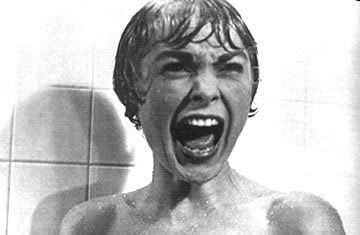
Psycho was a 1969 horror film made by Alfred Hitchcock and starred Vivian Leigh as “Marion” and Anthony Perkins as “Norman Bates”.
The film was shot in black and white and had quite an impact when it was first released. In fact, the film was so controversial that you were not allowed to show up to the theatre late and people were encouraged to keep the twist ending a secret from their friends, as to not spoil the fun of seeing the movie progress through its unique and shocking plot twists.
The film starts off mild-mannered enough. We see a woman(Marion) waking up from a romantic night with her boyfriend. Nothing out of the ordinary, so far. Until one day, while Marion is at work, she is given a spot of good fortune. All of a sudden her boss’ friend just hands her forty thousand dollars. She promptly takes the money and leaves town.
It is when she first leaves town with the money that you really start to hear the beautiful craftsmanship behind the musical score. Every note just keeps eluding to something big about to happen just around the corner. This seems to be a key element of the film. Every time you think that the “action” is over, the musical score hits you like a brick wall to remind you that yet another twist is right around the corner.
After Marion leaves town, she gets tired from driving and stops off at the Bates’ Motel. This is where we meet Norman Bates. He seems like an average middle-class man supporting his mother by running a motel. But if Hitchcock has taught us anything, it is that we should never judge a book by it’s cover. After the introduction of Norman Bates, the film goes into detail about his hobbies and interests. It is at this point that we realize that there may be more to Norman Bates then meets the eye.
I will, most certainly, not give away the ending, but I would be remiss if I did not talk, at least a little bit, about the now infamous “shower scene”. If I were reviewing this film back in 1968 I would definitely leave you hanging in suspense by this point and start to wrap up my review. But enough time has passed that, while not everyone has seen the ending, everyone, at least, knows about the shower scene. I will be honest, it really has not stood the test of time very well. Maybe back in the sixties it was considered obscene or gory, but by today’s standards it is to jokey and campy to elicit anything outside of small giggles and the feeling of getting ripped off. Why ripped off? Because by today’s standards for horror movies, when the director waits 40 minutes to kill off the leading lady, there had better be one hell of a bloody payoff. Instead, in Psycho we get choppy camera angles and a few drips of blood running down a drain.
But what the film lacks in a good payoff in the shower scene it more then makes up for with its following suspense and shocking twist ending. The rest of the movie, without giving away anything too interesting, involves a detective searching for Marion and her forty thousand dollars. At the same time, her sister and boyfriend hatch a plan to search for Marion as well, only to discover the deep, dark secrets hidden inside of the Bates Motel.
The setting and ambience is impeccable. From the old, Victorian style of the Bates’ house, to the creepy and rustic atmosphere of the motel itself. Alfred Hitchcock made sure that if the musical score and building suspense didn’t scare you, that at least the setting would.
On a scale of one to five stars I would have to give Psycho 3 stars. While it is truly a milestone in cinema history as well as being an effective horror movie back in the 1960s, its shock value has been reduced by the ever-growing tolerance of society towards horror movies that contain more and more gore and violence. Unless you are a die-hard fan of Hitchcock or a huge movie buff, save this one for a Saturday night rental.
